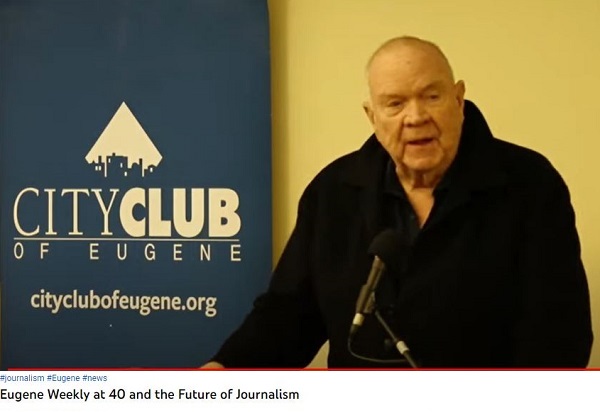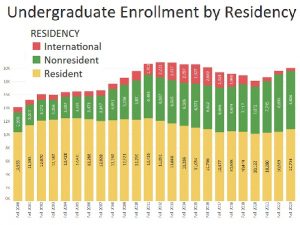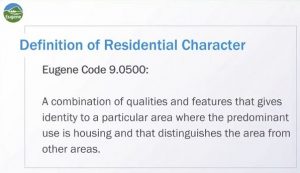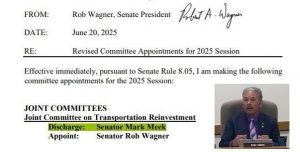City Club, Eugene Weekly look to the future of local journalism
8 min read
With the state of local journalism, here’s the Jan. 6 City Club in 10 minutes.
[00:00:05] Kaarin Knudson (City Club): My name is Kaarin Knudson, and I’m City Club’s president. Thank you to Andrew Kalloch for coordinating today’s program.
[00:00:11] Andrew Kalloch (City Club): Thank you, Kaarin. Today we are honored to celebrate Eugene Weekly and to talk about the future of local journalism with three great speakers: Camilla Mortensen is the editor-in-chief of Eugene Weekly. Ella Hutcherson is a senior in the Clark Honors College at the University of Oregon. And Brent Walth is an assistant professor at the UO’s School of Journalism and Communication. He has 30 years of experience as an editor, author, and investigative reporter. He has won Oregon’s top reporting prize five times—and the Pulitzer Prize in 2001.
[00:00:41] Brent Walth (UO professor, Catalyst Journalism Project): I was a reporter for a long time and a lot of my friends from the business ask me why I’m still teaching journalism given the state of things. And, in sort of a, I don’t know, a faith-based way, I guess, I refuse to give up on it. I refuse to give up on the idea that we have a role in democracy, to provide the information we all need to make decisions; that we bear witness; that we try to understand how the world should work, actually works, and describe the gap in between.
Now one of the reasons that we’re talking about this today, frankly, is the erosion of what we’ve seen at the Register-Guard. But you know, it’s happening across the country. Since 2004, 1,800 newspapers have closed. The most recent number I’ve seen in Oregon is 25. Newsrooms that remain are smaller.
[00:01:30] Now, with the loss of news coverage, we hear this term ‘news deserts:’ huge, vast areas, usually in rural parts of the country, that have no news coverage at all. We don’t typically think of news deserts as cities like Eugene or Salem, the second- and third-largest cities in the state. And yet we have seen diminishing coverage.
[00:01:53] Now, Eugene still has terrific news media. You have strong TV stations, strong radio—KLCC, it’s fantastic. And of course Eugene Weekly, so it’s not a desert here yet. But the consequences of it is a continued lack of trust, a loss of trust in the news media. It strains the trust even further if the news audience doesn’t see the news media covering the things that they once did, and the things that are most important. It’s not that reporters and editors don’t want to, it’s that the resources often aren’t there.
[00:02:21] Who owns the Register-Guard? Gannett. Gannett is a company that has 100 daily newspapers, or mostly daily, I guess, and 1,000 weekly newspapers. It’s a publicly-traded company that had $3.4 billion in revenues last year, but it also lost $134 million. Wall Street stock analysts say if you have Gannett stock, sell it yesterday.
[00:02:45] But who owns Gannett? The two biggest stockholders in Gannett are major investment firms. One is called BlackRock, and if you haven’t heard about BlackRock, it has major positions in companies such as Time Warner, Disney, and Apple. The second is Vanguard Group. If some of you might have mutual funds or so on in Vanguard, you might be part of the ownership of the Register-Guard. And these two investment groups manage funds in the range of $18 trillion—enormous funds—and they’re in effect, the controlling interest of Gannett.
[00:03:19] Now, where is a community like Eugene in that range? Probably not particularly present. We could ask Gannett to give the Register-Guard back to the community. One of my colleagues, professor Peter Laufer, has actually proposed this in a column he published in Eugene Weekly. He’s been reaching out to Gannett, trying to see what’s possible. His idea is to bring it to the journalism school, so we can try to revive that as a brand and as a service to the community.
[00:03:44] But I would not wait for those miracles. This is a local challenge. Your problem is local, your crisis is local, and your solution must be local. No one’s going to come to the rescue of the Eugene-Springfield area in terms of replacing what’s been lost with the ‘Guard unless there is a local answer for it. What will that look like? More selective, deeper coverage, faster, and moving towards digital. We’re often looking at a non-profit model.
[00:04:12] Really what we’re talking about is needing leadership that will propose working models. That’s going to come from the community, people who can really make a difference. So I ask everybody: Think about it, talk to your neighbors, discuss what’s possible, and when you hear and see something begin to arrive—‘cause I think it will soon here—support it, read it, listen, and help make a difference.
[00:04:40] Ella Hutcherson (UO / Ethos Magazine): Hi. I just want to say it’s really an honor to be asked to be here today, speaking among other journalists that I admire so deeply.
[00:04:48] When I came to college here in Eugene, I had a passion for storytelling and no clue where to put it. However, I quickly found community in the UO’s School of Journalism and Communications, current and former journalists who were ready and willing to point me in the right direction. For me the right direction ended up being Eugene Weekly.
[00:05:07] I joined as an intern in the summer of 2021. Obituaries were run for 13 individuals who died in Lane County while homeless that year. I wrote about three of them. Their names were Charles Rintalan, Sarah Fallingwater, and Shandee Franke. I had the privilege of getting to know these folks through the eyes of those that loved them. While this was undoubtedly the toughest work I did at Eugene Weekly, I continued to feel that it was the most important.
[00:05:33] I feel unbelievably lucky that my time at Eugene Weekly has been so rich and so fulfilling, but I also know that in areas that lack a community paper like this one, young journalists are not being afforded such opportunities. I also think about all the stories that go untold, all the community members whose voices go unheard, when there is no publication so dedicated to its community to listen.
[00:05:55] Because I think it’s crucial for any community to have access to reporting that reflects them fully and accurately. I think it’s beautiful to be aware of the art, the filmmaking, the music, the writing that is happening here every single day. I think it’s necessary that those making active change in our communities are being recognized.
[00:06:12] And I think it’s vital that the Charles Rintalans, the Sarah Fallingwaters, the Shandee Frankes of every community, that their stories are being told. Because when that doesn’t happen, how do we as a community truly know who we are? Who is living, creating, fighting, and dying among us? What stones go unturned when we lack the resources or the people to find them?
[00:06:34] So while I am scared by the precarity of journalism today, my time at Eugene Weekly made me certain that this is an industry worth fighting for, and I’m happy to now be part of that fight.
[00:06:44] Camilla Mortensen (Eugene Weekly): That’s something I loved about the Weekly when I first started and something I still love. We take on beginning journalists and we launch them. We provide a little stipend, training, and the platform. I’ve had former interns who’ve had front-page stories in the Wall Street Journal; you hear two of them on OPB; one just got hired by the Associated Press as a Michigan statehouse reporter; and actually the one who was in the Wall Street Journal was my student at LCC (Lane Community College), was coming actually back from a stint in prison with heroin addiction, and has now turned his life completely around, and gone on to become a really great journalist.
[00:07:16] We are an alt-weekly, but we’re also very much a community paper and we’re one that tries to give voice to our community members. And I think that community connection is also why we’re seeing the Chronicle (formerly the Creswell Chronicle) grow as it covers communities such as Creswell, Pleasant Hill, and Springfield. People seek that community and that accountability, and honestly, that feeling we get when we have something for posterity—to be able to hold onto something.
[00:07:39] Eugene Weekly wants to support that. So we founded a nonprofit and since we still also like our radical roots, we named it TRIPS: Twin Rivers Institute for Press Sustainability, and the mission is to support the Weekly and other small local papers around the Willamette Valley.
[00:07:52] This paper and this community have supported that. I can only hope we will continue to create more journalists, more good journalism, and more good in the world.
[00:08:01] John Q: The session began by announcing a new home for City Club: The Maple Room at the 5th Street Market.
[00:08:08] Brian Obie (Obie Companies): We’re pleased that you’re here, really pleased you are here.
[00:08:11] When Mayor Kitty Piercy approached me about a desire to find a home for City Club, it really hit me that the City Club coming to the Market District and what it means to Eugene—it’s an important marriage.
[00:08:27] I’ve obviously been involved in the City of Eugene for a long time, even longer than the City Club. But I know how important it is. I know the issues that have been covered by this organization over time and the impact that you’ve had on this community. I hold that in high esteem.
[00:08:44] So again, welcoming you, I don’t know that we would want to braggadociously say the ‘New Downtown,’ although many people compliment me in that regard. (They) say, ‘Brian, it’s great you guys have created this New Downtown and space for us.’
[00:09:00] What I want it to be is ‘a new beginning for Downtown,’ so that we can spread this enjoyment and participation throughout our downtown area. And I think you, by meeting here, and the issues that you take up, can have a lot to do with that.
[00:09:16] We do have a lot of work to do in this community. Certainly, the hot topic of the day is climate, but if you want to talk to the hot topic of the citizenry, it’s homeless and it’s about how we feel about our community. And this organization can impact that.
[00:09:32] And I expect it and am hopeful that it will impact that because it impacts this neighborhood. So with that, I want to thank you and appreciate you being here and look forward to the weeks, months, and years ahead.
[00:09:45] John Q: From The Maple Room at Fifth Street Market, Friday lunch at City Club. Support local news at Eugene Weekly, and other nonprofits.



